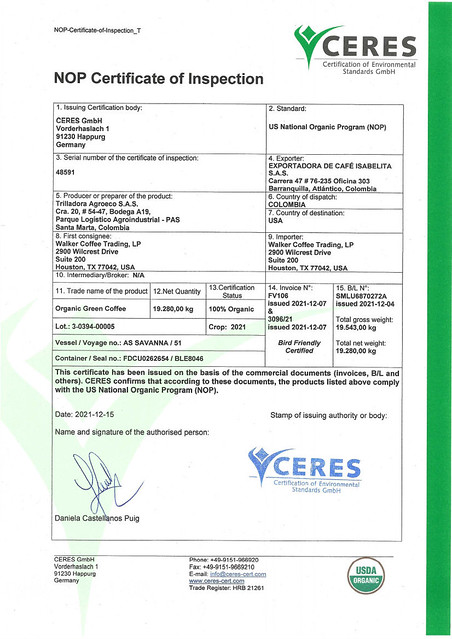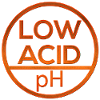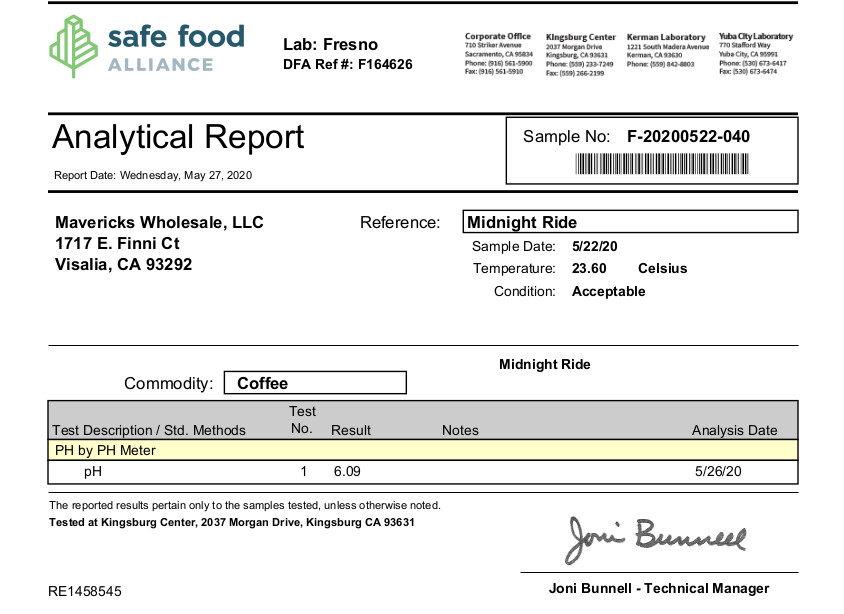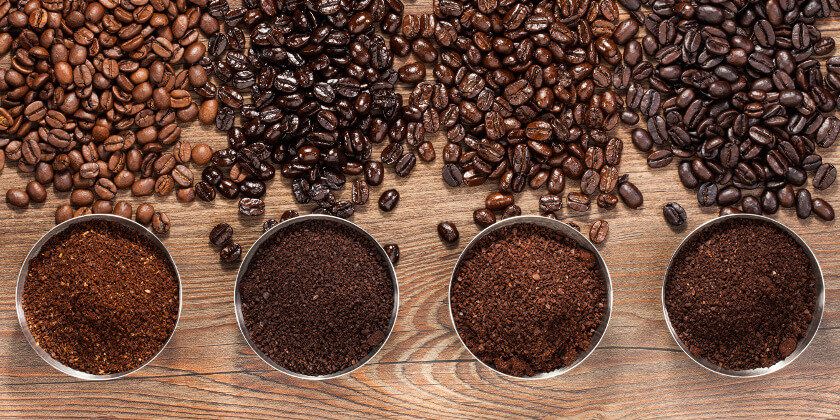
What is Healthy Coffee?
Is coffee healthy? That is a common question many people that drink coffee have asked me over the years. The good news is that coffee is not inherently bad, otherwise we would all probably be dead.
The better question is how can coffee affect my health? Well, if you buy your coffee from a grocery store in a red can, chances are you are not doing yourself any favors. You are probably not consuming a specialty grade coffee, it is probably not organic, and doubtless that it is not low in acid. And on top of that the flavor is....well, not so good.
While each persons health is different, and far be it from me to dispense medical advice, the point is to put yourself in the best possible position. Chose a coffee that checks the boxes and removes potential issues. George Burns smoked cigars till he was a 100 years old, however, it is probably not the healthiest idea to do the same.
A series of informed decisions usually works out to your advantage, while there are always exceptions to the rule, the George Burns of the world. Or the people that have a stomach like a rock and can eat or drink anything.
Here are somethings I wish to share with you regarding finding a coffee that should check the boxes and make your health the priority.
Is your coffee low acid, organic and not genetically modified? Is your coffee slow roasted and free of molds?
Some coffees can natively affect peoples physiology. Some people are susceptible to various foods, by allergy or by diet, some people have reaction to high acidic foods, such as coffee.
Let's consider organic coffee for a moment.
Organic Coffee Beans
What are organic coffee beans? Simply, Certified coffees are produced according to USDA National Organic Program standards. That means that Organic is a federal standard for any product sold in the United States baring an organic label .
According to our certified agency partner CCOF, which inspects our coffee, certified coffee is grown in "soil that has been free of prohibited substances for three years prior to harvest to ensure that the crops will not be contaminated". Of course, it does not end just with growing, it is the entire approach that takes into account all processing methods, materials, storage, handling, any other facets of the coffee production process from beginning to end. All aspects of the cultivation, processing, handling, transport, and production of coffee beans, from growing to roasting, must meet those federal standards.

I am not saying conventional coffee is not safe to drink, but what I am am saying is that certified coffee must adhere to very strict standards and product chain of custody. We actually have to track the coffee all the way back to the point of origin.
Another positive of certified coffee is that many people may not know is that organic coffee is a great way to know if a coffee has been genetically modified.
Genetically Modified Coffee
Whether food products are genetically modified or not genetically modified is becoming more important to more and more people today. Did you know, that if the beans you buy are organic they are not genetically modified! That is right, organic coffee by definition is not genetically modified.
Health benefits of Low Acid Coffee
All coffee has acid and lots of it. In fact, coffee has so much acid that millions of would be coffee drinkers have to shy away from drinking coffee, or modify their consumption levels, or modify their coffee to attempt to address their symptoms.

People's Health Conditions
Health problems such as GERD, Interstitial Cystitis, IBS, soft reflux, and Barret's syndrome to name a few gastrointestinal and gastroesophageal issues that millions of people suffer from can be exacerbated by a high acid diet, which includes coffee. Just like certain residual traces of chemicals used in cultivation of coffee or processing agents used during manufacturing can acid in coffee can also affect certain people.
Our health changes over time
And let's face it, as we age our body becomes more susceptible and sensitive to various things then when we were young. So while we may not have a problem now, no sense consuming these red canx of coffee, when much healthier and better tasting alternatives exist.
Low acid coffee is coffee that has significantly reduced levels of acidity in the coffee bean. By weight, nearly 8% of coffee is acids. Low acid coffee minimizes acidity and if you chose a slow roasted coffee, acid levels will be brought down to trace amounts.

Mycotoxin Concerns
Mycotoxins are toxins that are produced by molds. Coffee can be susceptible to mycotoxin as coffee can be a fertile ground for molds, as with most other foods, if it is not handled correctly. First off, you should not be buying non specialty grade coffee (sorry red can in the grocery store).
Processing coffee at origin
The processing of specialty grade coffee from cultivation to export needs to be carefully handled. Coffee must be harvested, pulped, washed, dried, and stored in such a manner to maintain a tight range of moisture content and water activity for flavor, taste, and freshness, while not having too much moisture that it will mold. And this of course, just describes the process before the coffee hits the dock to be exported and takes a multi-week journey on the ocean before it arrives to our shores.
Better methods for processing coffee
Chose Specialty Grade coffee, and be careful with "naturals" and other fermented specialty coffees. (Get washed, E.P. European Prep, or semi washed Arabicas)
So here is good list:
-
Organic
-
Not Generically Modified
-
Low Acid
-
Specialty Grade
-
Slow Roasted
Drinking Coffee with Caffeine
Now I would be remiss, if I failed to mention caffeine. For most coffee drinkers, particularly those hanging out in the local coffee shop, decaf coffee is unthinkable. However, let me tell you caffeine can also be problematic for many people. While it wouldn't say caffeine is unhealthy, because there is much scientific literature written to the contrary, chronicling the positive effects of caffeine on immune health, learning, and memory among others, for people with certain health issues, caffeine should be monitored and in some instances avoided.
For some people, they may wish to add caffeine to the list as well. See my article on finding a good water processed decaf coffee.

Find a good black coffee.
Now for many the coffee experience is not really about the coffee, it's about what you put in the coffee such as milk, cream, sugar, various flavorings, syrups, artificial sweeteners or natural sweeteners or organic sweeteners like Monk Fruit, or Pyrue.
Even a pinch of cinnamon, probably doesn't hurt (unless you are allergic). For sure not all of these are bad, nor I am suggesting that you can't add to your brewed coffee to help tickle your taste buds, but first consider why you are doing this.
If your coffee actually tasted better from the start, being a specialty grade Arabica coffee roasted not by the ton, but by the pound. A coffees that was purposely and carefully cultivated to certified standards, and was not bitter and full of acid, you might find out that you like coffee again. That you do not need a lot of coffee additives in your cup to cover for a coffees poor quality, by adding unnecessary sugar, calories, and fat, with every sip. A low calorie drink is also helpful for people trying to maintain or lose weight.

The benefits great coffee can go along way. Certainly, that breakfast of cup coffee can still be super healthy and delicious cup without having to overdue it with additives. A good cup of coffee will allow you to reduce if not eliminate those additives if you so desire.
How Do you make your coffee?
Do not cheat yourself with a poor means of grinding and brewing your coffee. You would be shocked how many people stumble right here and cheat themselves.
Brewing Coffee Right
Whatever method you prefer to brew; regular decanter coffee brewer, that old percolator, that tried and true French press, pour over, single serve, cold brew, you name it. Here is a few other things to consider.
Grinding Coffee Right
Bad grinding and brewing can make a good coffee taste bad. Now, you are back to having to excessively doctor an otherwise delicious and healthy coffee.

If you have a good quality grinder that produces a uniform coffee grounds, proceed on. If not either get a good grinder or have it ground correctly by your roaster. They have the right equipment. Make sure you let them what brewing method you use, having beans ground the wrong way can effect taste as well.
Lastly, make sure you actually clean your coffee brewer and that is works as it is suppose to work. Dirty or dilapidated brewers can negatively affect flavor and now your back to putting excessive additives in your coffee.
Summing it all up
While decaf or caffeinated may come down to a persons medical situation (even pregnancy can be affected), the last few items finding a good tasting coffee, grinding correctly, and brewing are directly health related (although poor quality coffees do taste worse), mis-grinding your coffee and having a lame brewing system will affect your coffee experience and for many people drive them to have to "fix it" with a bunch of additives.
So here is our list again, plus a couple procedural notes and a thing or two for consideration. Now you may have some additional thoughts, just leave some comments below.
-
Organic
-
Not Generically Modified
-
Low Acid
-
Specialty Grade
-
Slow Roasted
Plus, a few things to consider
-
Start with a high quality good tasting coffee
-
Make sure the coffee is uniformly ground coffee for your brewer
-
Make sure your brewer is in good working order
-
*Pro-tip: if you use a mug, make sure to actually clean that thing out from time to time!
(Most people, body, life, first sip)
Now, if you do not feel like scouring the internet to find a coffee that checks all the boxes, you can just give Mavericks a try. I have been doing this for about 20 years and have many a customer that enjoys a highly-drinkable and healthy cup of coffee.
Just shoot us your email in the box of the bottom of the page I will send you a high-value coupon for your first order.
Sincerely,
-Ryan
Q&A
What are the healthiest coffees?
Organic and low acid coffee with a high pH.
Can organic coffee be genetically modified?
No. By definition if your coffee is organic, it cannot be modified genetically. Genetically modified coffee beans would be prohibited by the USDA NOP program.
What can make coffee unhealthy?
High levels of acidity, some chemicals used in cultivation, certain processing agents in general, and certain chemicals used in decaffeination like Methyl Chloride. Poor growing practices and substandard process or raw coffee at the country of origin, encourage mold growth and incidence of mycotoxins.